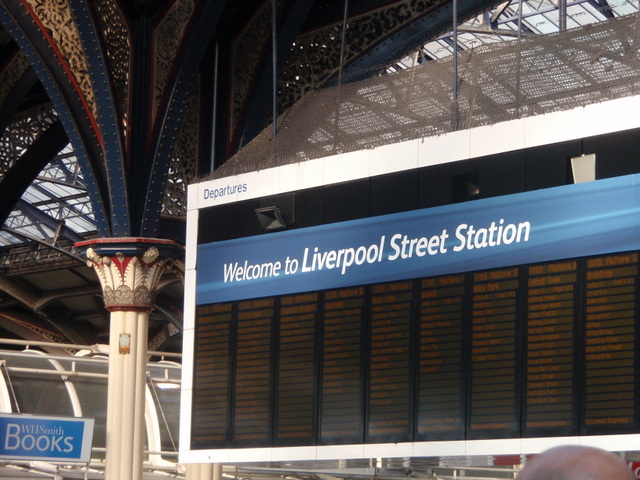London is just one city in the UK. But with the cost of travelling in the country so ridiculously high, can you blame so many visitors for not venturing beyond the capital?
There are cheap ways to travel around the UK. Sometimes ridiculously cheap. But finding those rumoured £1 fares is tough unless you know where to look.
Don’t buy at the station
Buy train tickets on the day, at the station and you might as well just open your wallet and let them take what they want. The official railway website isn’t much better. It will offer the cheaper fares, but you have to find them first.
Check out The Train Line.com On popular routes you can browse fares over a five-day period and check out the cheapest option. Once you’ve found the best price, you can search for that train and book your tickets through the official National Rail website. You can book through The Train Line, but a lot of people prefer to go through the “official” channels.
Never book a ticket without looking at all your options. On some trains between London and Manchester the cheapest ticket is listed as £108, but leave a few hours earlier and you can travel the same route for less than £20.
It pays to shop around for bus fares also. National Express tickets can be quite pricey, however Megabus (which operates between most major cities) has seats as low as £1.
Secret savings: The Train Line.com website can be a little sneaky. When you look at a journey repeatedly, the website registers your interest and next thing you know, the fare has gone up a couple of pounds. One way around it is to do all your research for times, fares, routes etc on one computer, then jump on another to book the trip you want.
Consider in-direct options
If you’re booking a particularly long journey, chances are you’ll change trains along the way. It’s worth comparing the prices of each leg of the trip – it may work out cheaper to book them separately. The downside is that you want to leave enough time to make the connection, as you won’t be entitled to a refund if you miss your next train.
Plan ahead
Spontaneous travel will cost you – a lot. But if you know where you want to go and when, there are big savings to be made. A last-minute train ticket from London to Manchester can easily set you back £60, but advance tickets are as cheap as £12.50.
A bus ticket between Cardiff and Manchester with Megabus one week out will cost about £19, but book a month or so in advance and you can score on those legendary £1 fares. Megabus also sells cut-price train and ferry tickets. I recently booked a fare from Rosslare in Ireland to Cardiff in Wales for £1 plus a 50p booking fee. I booked about three months ahead and haven’t decided if I’m going to take it, but for that price, it doesn’t really matter.
Be flexible
If you’re prepared to get up at 4am to catch a train or bus, the potential savings will more than pay for the extra coffee you’ll need that day. Travelling in peak times is when things get expensive. Try to avoid travelling on Fridays or Sundays – that’s when everyone else is trying to get away for the weekend. Saturday is usually a good day to travel by train, and there are lots of mid-week bargains.
If you’re covering a long distance (for example London to Glasgow) consider an overnight bus. The bus ticket will usually be cheaper plus you’ll save on accommodation. Most of the major train stations have luggage lockers so you don’t have to be stuck with your bags if you arrive before check in time.
Day trips can be cheaper
By some bizarre logic, return tickets – specifically same-day return tickets – are almost the same price as single tickets.
A single trip between Glasgow and Edinburgh costs £12.50. A same-day off-peak return costs £12.60. It’s worth doing your research and work out if you should spend a night somewhere or just take a day trip.
In England’s Lake District, where I’m living now, a day pass on the bus (between £7-£11) can be cheaper than a one-way ticket between some towns. It is cheaper for me to buy a Central Lakes Day Rider, which allows me to travel been Coniston, Ambleside, Windermere and Grasmere all day, than buy a single one-way ticket between Coniston and Ambleside.
It pays to ask for the cheapest option. Don’t expect the driver or ticket seller to be thinking about your budget.
Think local
Many regional networks are particularly extensive in the UK. If you’re travelling in England’s North-West, the same ticket with Stagecoach that gets you between towns in The Lake District can also take you across the other side of the country to Newcastle. Not bad for £10.30
A National Express bus between Carlisle at the top of England and Edinburgh will average at about £20. But the little-known First Borders service costs just £6.90 to travel between the same cities – although it takes the long way.
Travel like a local in London
If you’re in London for more than a couple of days it is worth buying an Oyster Card. That’s the little blue card you see most commuters swiping as they go through the ticket gates. Oyster Cards can be bought at the Tube station for a deposit of £5, which you get back if you hand your card in before you leave. The cards can be used on all underground lines and buses in the city, plus a handful of suburban lines. (Note: Oyster Cards can not be used to or from Heathrow Airport.)
If the thought of not searching for cash every time you ride the Tube isn’t enough to sell you on investing in an Oyster Card, hears the winning argument. A trip in Zone 1 paid for in cash costs £4.50. That same trip paid for with an Oyster Card costs just £2.10. You can top up your balance at the ticket machines in the stations.
If you’re going to be using public transport a lot while in London, a seven-day travel pass (£30.40) may work out better value, but that depends on your needs.
What’s your secret to travelling cheaply in the UK?






